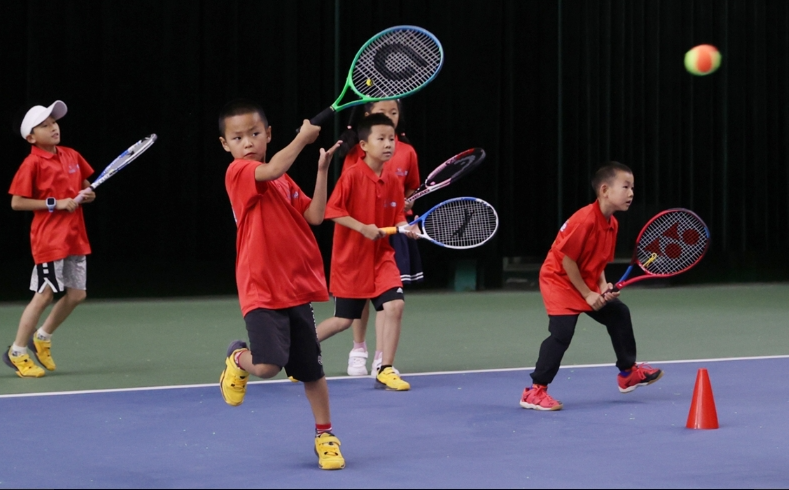In recent years, tennis in China has experienced a remarkable surge in popularity, transforming from a niche sport to a national craze. Fueled by the success of local tennis stars on the international stage, the sport is capturing the imagination of Chinese audiences like never before, leading to packed stadiums and a rush to book tennis courts across the country.
The rise of tennis in China can be largely attributed to the outstanding performances of young athletes like Zheng Qinwen, who clinched a gold medal in women’s singles at the Paris Olympics. Her victory, along with strong showings from Zhang Zhizhen and Wang Xinyu, who earned silver in the mixed doubles event, has reignited a passion for tennis among the Chinese public. These achievements have had a profound impact, inspiring a new generation of players and enthusiasts.
Tennis Courts in High Demand
Yang Qi, a new tennis enthusiast from Beijing, reflects on how challenging it has become to book a tennis court since the sport’s rise in popularity. “It was much easier to find a court before the Summer Olympics, but now it feels like everyone wants to play tennis,” she says. The increased interest is evident as domestic tennis events, such as the China Open, Wuhan Open, and Shanghai Masters, have seen record attendance, with tickets selling out well in advance.
The China Open alone saw ticket sales exceed 80 million yuan ($11.25 million), with over 29,000 fans attending key matches, filling venues to capacity. The Shanghai Masters also reported record-breaking crowds, with more than 220,000 spectators attending the tournament, demonstrating the sport’s growing appeal across the country.
Professional Success Inspires Fans
Chinese tennis players have made significant strides in both men’s and women’s competitions, contributing to the growing fanbase. In the men’s circuit, young players like Zhang Zhizhen, Bu Yunchaokete, and Shang Juncheng have reached new heights, with historic performances that have elevated Chinese men’s tennis to international recognition. Zhang became the first male player from the Chinese mainland to be seeded at a Grand Slam, while Shang Juncheng made headlines as the first player born after 2005 to win an ATP title.
On the women’s side, Zheng Qinwen’s consistent performance throughout the season, highlighted by her Olympic triumph, has set the stage for even greater achievements. At the Wuhan Open, Zheng’s popularity helped draw crowds to the stadium, underscoring her influence on the sport’s growth in China.
Grassroots Efforts and Training Expansion
As tennis continues to grow in popularity, efforts to nurture young talent at the grassroots level have intensified. In Zheng’s hometown of Hubei, Jingshan City has become a center for tennis development. Officially recognized as the “Tennis City of China,” Jingshan boasts over 340 tennis courts and a thriving community of players. The Hubei Tennis School, located in Jingshan, is dedicated to training future tennis stars, with more than 460 students currently enrolled in its specialized tennis programs.
Zhu Dingzhu, president of the Hubei Tennis School, believes that the school’s new facilities and focus on developing young talent will help produce the next generation of Chinese tennis champions. “We hope to see more players like Zheng emerging from our program, and with the right support, we believe we can contribute significantly to China’s tennis success on the global stage,” Zhu said.
Sustaining Long-Term Growth
Despite the sport’s current popularity, tennis remains a relatively expensive pursuit in China, with high costs associated with equipment, coaching, and court rentals. This has led some experts to question how sustainable the current enthusiasm for tennis will be in the long term.
Beijing-based tennis promoter Qiu Youyi highlights the need for a balance between elite training and broader participation. “To keep this momentum going, we need to focus not just on producing elite players, but on fostering a love for the sport that can last a lifetime,” Qiu said.
Tennis commentator Chen Chi is optimistic about the sport’s future in China, pointing to the recent achievements of Chinese players as a catalyst for further growth. “With more Chinese players making their mark on the international stage, the sport will continue to capture the public’s interest,” Chen said. “As more young people pick up the racket, we could very well witness the rise of the next tennis superstar from China.”
Looking Ahead
As China continues to develop its tennis infrastructure and support systems for young players, the country is poised to become a major force in the world of tennis. From grassroots programs to international competitions, the sport’s growing popularity shows no signs of slowing down. If the current trajectory continues, China may soon see even more of its athletes dominating tennis on the global stage, and the sport may cement its place as a national favorite.
ChatGPT 也可能会犯错。请核查重要信息。

